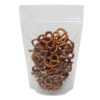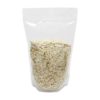Blog
Caffeine for Teens: Good or Bad?
Caffeine is always termed the most consumed psychoactive substance in the world, and its negative effects have always received their fair share of coverage.
But in this time-hungry world, caffeine remains an unavoidable compulsion, previously among adults only and now among teenagers too, according to new trends. And it’s been going on for a while.
As long ago as 2003, a revealing study on caffeine use among American teenagers published in the journal Pediatrics found that over half of American teenagers consumed about 52.7mg/day of caffeine from everyday soft drinks such as soda.
It also found that a smaller percentage of teenagers (18.8%) consumed up to 100mg/day, which is noticeably higher and also the exact figure the American Academy of Pediatrics believes should be the limit.
That number is expected to be much higher now as more and more teenagers embrace energy drinks and caffeine products like coffee and Peach Snapple become more popular among teenagers.
But the question remains: Is caffeine good or bad for teens?
The Effects of Caffeine
Caffeine has been the object of research for years now, and from various results, the general consensus is that consuming it comes with both good and bad effects.
The good effects include higher alertness and boost in energy and mood. Caffeine’s brain stimulant abilities are believed to trigger the former. In addition to alertness, research shows that consumption results in faster response times, higher vigilance and faster processing of information – all mental tasks. This explains why many users employ it for staying ‘awake’ for longer.
Caffeine’s stimulant abilities are also to credit for its power over mood, which research shows it achieves through triggering some of the body’s most important neurotransmitters (and the ones responsible for mood hormones) such as dopamine, acetylcholine and norepinephrine.
Hormones such as dopamine have been found by scientists to directly affect mood and happiness with their fluctuations. Caffeine’s abilities trigger a similar reaction for energy boosts, which explains the popularity of energy drinks.
The bad effects are plenty and have been given extra coverage over the years. Some of the most commonly seen negative effects include:
- Insomnia
- Restlessness
- Increased heart rate
- Hypertension
a. Caffeine has been found to trigger insomnia among individuals who didn’t previously suffer from it, especially with extended use as people try to stay awake for longer. This effect is seen across age groups, including among teenagers.
b. The same applies to restlessness, which is associated with jitteriness, especially after extended or excessive use. Caffeine users start to feel indefatigable and unable to sit still, sometimes for hours on end.
c. The ideal resting heart rate is between 60 and 100 beats per minute, although it can go as low as 40 beats per minute. Consuming up to 360mg in one day (the same as 3.5 cups of coffee) has been found to speed up the heart rate to a lot higher than the ideal heart rate above.
Even higher doses can trigger changes in both regularity of the heartbeat and the heart rate itself, resulting in a serious heart condition commonly known as cardiac arrhythmia. Individuals with existing heart conditions are advised to fully avoid caffeine-filled drinks. Nevertheless, long term effects on the heart condition from caffeine consumption haven’t been found or proven yet.
d. Studies show that caffeine also exhibits the ‘pressor effect,’ or the ability of caffeine to trigger higher blood pressure when consumed. This effect is common among individuals with hypertension or a history of, and can be experienced among individuals of all age groups, including teenagers.
Important Things To Know
i. Caffeine is a Stimulant. The reason it has its effects on people is because of its unique stimulant abilities on the body’s central nervous system, which comprises the brain, nerves, neurotransmitters and many other important body organs.
ii. Some research has shown that caffeine can delay brain development. Because of its effect on the brain, caffeine may delay brain development, according to research. For teens, consuming caffeine may disorganize the formation of major brain sections, triggering poor development.
Additionally, one of caffeine’s biggest effects, increased alertness, usually leads to sleep deprivation and insomnia among teens that overuse the compound, both of which can alter brain development.
iii. May cause the body to lose calcium leading to a higher risk of osteoporosis. Calcium is required in growing children and teens, mostly for bone and nail development.
Teens that consume milk and other healthy foods for energy drinks and other caffeine-heavy drinks risk losing calcium within their bodies, exposing them to osteoporosis.
Studies also show that consuming excessive caffeine over time can lead to a bone mass loss over time, even in teens.
iv. It can be addicting and withdrawal symptoms can occur. Caffeine is a psychoactive substance, which means that it can become addictive. Experts say the addiction experience is seen in two stages: tolerance and dependence.
Tolerance occurs when a user starts to consume caffeine more frequently or in larger doses just to achieve the same effects. When a user tries to stop using caffeine, they will start experiencing withdrawal symptoms. Consuming more caffeine to mask and avert these withdrawal symptoms is referred to as dependence.
Thereafter, one finds themselves fully dependent on caffeine to get through days and nights. Most people call this an addiction to caffeine, although in the scientific sense, caffeine is not considered strong enough to cause addiction.
Attempts to stop using it later this always results in withdrawal symptoms such as headaches, anxiety, lethargy, and anxiety.
v. It affects boys and girls the same before puberty, but research has shown that there are differences post-puberty. Research shows that the effects of caffeine consumption in teens affect both girls and boys in the same way before puberty hits. Such effects can include increased heart rate and increased alertness.
The same studies show that after puberty, boys and girls experience the effects differently. Boys may see a lower heart rate while girls might see more increases in diastolic blood pressure.





